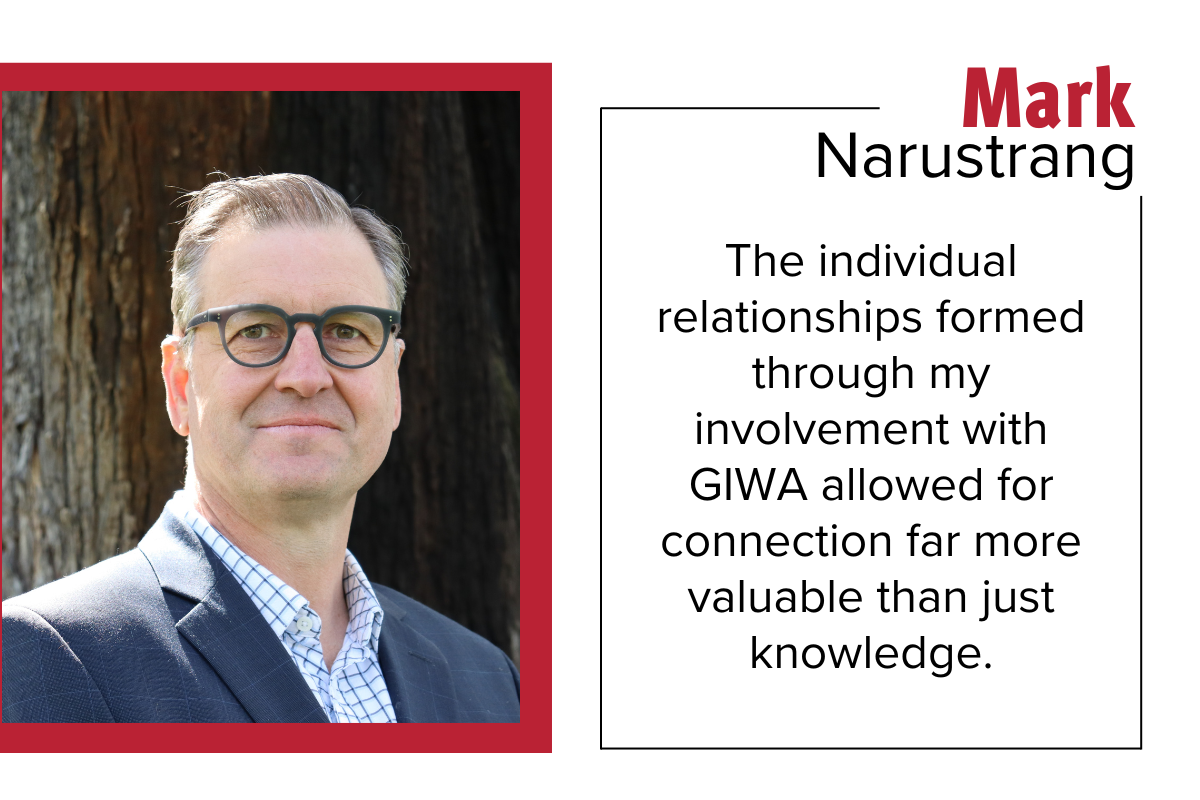 MARK NARUSTRANG is Principal Consultant at Pivotal Point Strategic Directions and works with Boards and Executive in improving their business performance and resolving complex problems through strategic and commercial analysis and independent advice.
MARK NARUSTRANG is Principal Consultant at Pivotal Point Strategic Directions and works with Boards and Executive in improving their business performance and resolving complex problems through strategic and commercial analysis and independent advice.
Mark has worked with a number of significant agribusinesses in Australia as both a consultant and a senior manager including 11 years at CBH Group.
He joined GIWA in 2014 as the CBH representative on the Board and after leaving CBH a year later chose to remain on the GIWA Board as an Independent – a position he has held for nearly 10 years.
In 2022, Mark became Chair of the Processed Oat Partnership (POP) Steering Committee, an industry-led, state government funded initiative providing a foundation for growth in the oat industry over the next 20 years.
We caught up with Mark to talk about his involvement with GIWA.
Mark how long have you been involved with GIWA?
After ten years working in a Group Strategy role in the integrated beast that is the CBH Group, I was looking to be involved in the broader industry in some way. The opportunity to be CBH’s GIWA representative arose in 2014, and I took it.
After a year as GIWA’s CBH Rep, I left CBH and had a choice, resign from the GIWA Board or continue as an Independent. I moved into management consulting and wanted to stay connected to agriculture, simply because I liked it and had a natural interest in its inherent highly variable complexity.
I was not ‘born’ into agriculture through family or region, so GIWA enabled me to have a grain industry community beyond employment (noting that GIWA participation is voluntary). Accordingly, I am currently serving my tenth and final year on the GIWA Board.
In your roles with GIWA, what are you most proud to have been involved in and how has this contributed to the grains industry?
I have been a vocal supporter of WA having a strong voice during the consolidation of Australia’s Grains industry bodies.
Having worked across Australia in a variety of industries, I have seen on many occasions how 90% of Australia’s populace, located in the chunk of Australia that isn’t WA (poor souls), has influenced national decision-making, ignorant of the specific circumstances present in WA.
Given WA is easily the largest individual grain producing State and significantly reliant on export markets – events like the recently removed barley tariffs impact WA far more than they would impact NSW – WA should have a proportionally large voice in the grain industry. After all, it’s easier to see the weeds in your own garden than your neighbour’s, and the Nullarbor is a significant dividing fence.
The effort to maintain that voice is not finished, and probably never will be, but it is pleasing that GIWA’s commodity council model was adopted by Grains Australia nationally with good WA representation.
What do you feel you personally have gained from your involvement with GIWA?
GIWA is rare in Australian grain in that it’s a body with representation across the entire WA supply chain – not just one slice such as grain growers or stock feeders. GIWA’s strong cross-industry representation is critical in creating a great collegiate feel – the industry is all in it together and a rising tide lifts all boats.
Participating with GIWA fulfilled my original brief when I started almost ten years ago, of enabling a better understanding of the bigger picture. However, the individual relationships formed allowed for connection much more valuable than just knowledge – something that will hopefully last long after I finish up later this year.
Why do you think other members should consider being a part of a commodity council and the board?
I can sum it up as the following:
- Development: A new GIWA member can learn from some of the best in the WA Grain’s industry and use that experience to springboard to other industry roles.
- Influence: In addition to the many industry players that sit on Councils and the Board that a member has contact with, GIWA has a voice that is also heard from the GRDC to the Minister. But we need industry participants to continue to step up and not only rely on the usual suspects.
- Connection: As mentioned prior, there are not many opportunities to form relationships with grain industry participants across the gamut of the supply chain. GIWA is a great way to meaningfully connect beyond your immediate circle.